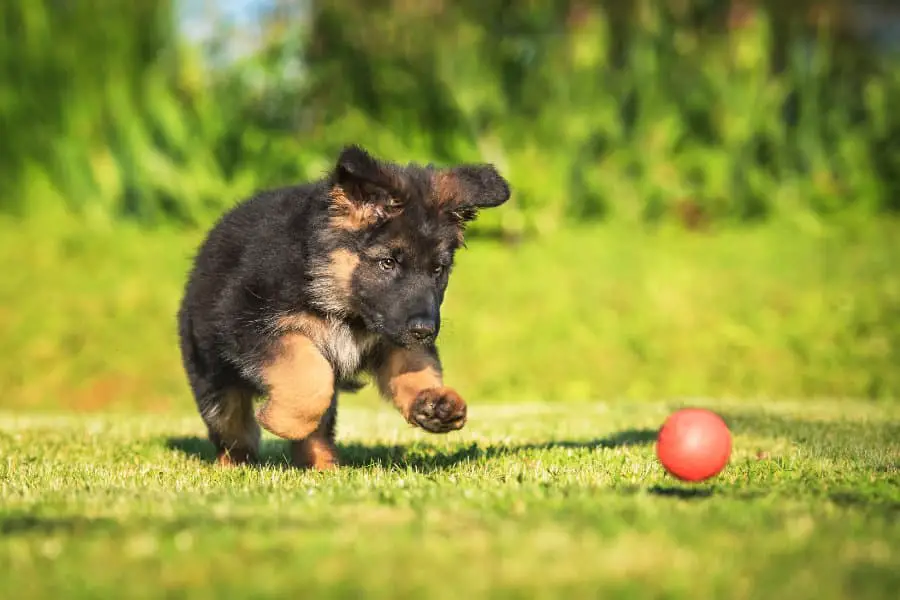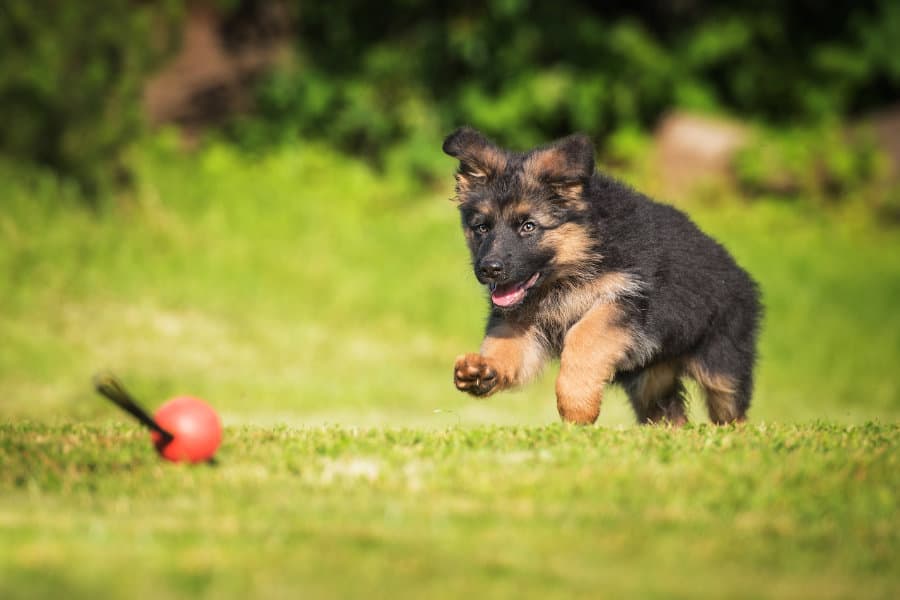Puppies are cute and a lot of fun to play with, but we often worry their spirited antics will lead to some accidents. Be it getting their leash caught in the picnic basket and taking it for a little adventure, to tumbling down a hill and into a pond. Some puppies, including German Shepherds, can be less gifted in the dexterity department with an almost complete lack of coordination at times.
German Shepherd puppies are known to be particularly clumsy and for various reasons. Their body type, large size, and the different stages of physical growth tied in with their boisterous, and at times, overly enthusiastic personality contribute to their clumsy tendencies.
If you are thinking about adopting a German Shepherd puppy or have recently adopted one, you may notice that they can be on the clumsy side and seem somewhat awkward at times. And while you might enjoy their playful antics and even find it endearing, you can’t help but think that there might be something amiss and are just waiting for an accident to happen. This should not deter you, as this phase of their lives is entirely manageable if you take the time to learn how to engage and develop the puppy correctly.

What Makes German Shepherd Puppies Clumsy?
The word ‘clumsy’ could be described as lacking in dexterity or grace and being generally awkward. While all puppies can be clumsy, some puppies take it to a whole new level. Puppies are a blessing to have around. They are cute, playful, and inquisitive. Watching them explore and learn can be a source of so much amusement and joy. So, where do you draw the line between cute and outright accident-prone and possibly even dangerous?
Think of a little Pekingese puppy. Small, light, and after a few minutes of gentle play, they generally feel the urge to lie down or snuggle in on their owner’s lap and take a nap. Then take a look at the other side of the scale, a German Shepherd puppy, not so small, vast amounts of energy and what could be described as a general lack of self-preservation.
German Shepherds are considered a large breed of dog, and as such, have a lot of growing to do before they reach full physical maturity. They are also very sociable and curious, and have a deep desire to be a part of everything that is going on around them. Coupled with their high energy level, this gives them a larger-than-life personality which frequently leads to calamity.
Mental Development Of A German Shepherd
German Shepherd dogs are known for their curiosity and their need for involvement in just about everything their humans are doing, which is, in part, why they make such attentive law enforcement dogs. They are intelligent and have a hunger for knowledge and participation. It is this need that often results in their antics leading to an undignified end. It is not uncommon for German Shepherds to attempt to imitate their owners by performing tasks such as climbing ladders or sitting on dining chairs.
Boredom can easily set in if they feel neglected or unchallenged or do not get the stimulation they need for proper mental development. If these puppies are bored and unsupervised, rest-assured, they will find something to amuse themselves with, often leading to some mishap. They require a lot of space to play due to their high levels of energy and physical size. Having several age-appropriate toys available and varying their training routines will keep them occupied and (for the most part) out of trouble.
Physical Development Of A German Shepherd
The physical development of a German Shepherd puppy into an adult happens in stages. As they grow, they need to adjust to their ever-changing bodies, and often it appears they don’t realize their size and weight.
German Shepherd puppies can have a hard time learning to coordinate, which can be a source of amusement and a source of frustration for them and their owners if not managed correctly.
- They will chew on everything:
- During their explorative phase, just like human children, they have an urge to put their mouth over just about anything they can grab. They can be incredibly destructive and will tear something apart merely for the amusement of it. No furniture, shoes, socks, and even hands and ankles within reach are safe. They have a powerful jaw, and it can be difficult to get them to release something once they have latched on.
- During their explorative phase, just like human children, they have an urge to put their mouth over just about anything they can grab. They can be incredibly destructive and will tear something apart merely for the amusement of it. No furniture, shoes, socks, and even hands and ankles within reach are safe. They have a powerful jaw, and it can be difficult to get them to release something once they have latched on.
- They are all legs:
- They grow upward first, gaining height but remaining narrow, giving them an awkward and gangly appearance during their adolescent phase. They are all legs and are often seen literally tripping over their own feet while running and playing during this stage.
- They grow upward first, gaining height but remaining narrow, giving them an awkward and gangly appearance during their adolescent phase. They are all legs and are often seen literally tripping over their own feet while running and playing during this stage.
- Watch out for the tail!
- Their long heavy tails also seem to have a life of their own and can cause quite the ruckus, knocking things flying while passing through the house or running full speed under the table that, just a few weeks ago, they managed to do with ease.

How To Handle Your Puppy’s Clumsiness
Mental and physical stimulation is the key to handling and working with your puppy’s clumsy behavior. German Shepherds are intelligent and will enjoy the interaction with you. Begin your puppy’s training from a young age to improve his coordination and understanding of boundaries and personal space.
Gently discourage behaviors that you don’t want to continue into his adult life. Allowing your pup to jump and bite as a youngster is unwise, as by the time they are fully grown, these habits will be challenging to correct. The same can be said about chasing after children and bicycles, jumping up on cars as they pull into the driveway, and jumping in the swimming pool after their humans.
German Shepherd puppies learn through play, and they like to play rough, be it with you, with other dogs, or with toys. Ensure they understand your physical boundaries and respect your space. Give them appropriate toys to play with to keep themselves entertained. If you don’t, they will find something to play with, and in all likelihood, it might be your best pair of shoes or the leg of your favorite coffee table. Observe how they act around people and play with other dogs. Don’t allow any undesired behavior to go unchecked.
It is wise to keep any delicate or valuable items above the tail-reach of your German Shepherd puppy.
Are German Shepherd Adults clumsy?
As your puppy grows both physically and mentally, his coordination will improve, and so will his mental capacity. As they mature, they grow out of their clumsy phase. They also start to fill out with muscle. As adults, they can be rather stern characters, taking their jobs seriously. German Shepherds are eager to please, and as they become more involved with their humans, they can be very thoughtful with their actions, making them wonderful working dogs.
Physical Maturity Of A German Shepherd
By around two and a half to three years old, a German Shepherd has reached full physical maturity. They have a good understanding of their bodies, their dimensions, and their physical abilities and limitations. (Read: German Shepherd Weight Guide)
Mental Maturity Of A German Shepherd
Mental maturity occurs at around three years of age, a little after they mature physically. And while they may outgrow their comical puppy behaviors and clumsy nature, the one thing which won’t change is their need to integrate themselves into everything going on around them.
Are German Shepherd Puppies More Clumsy Than Other Breeds?
Some breeds of puppies seem to be clumsier and more accident-prone than others. And these breeds have something in common; they are all large breeds of dogs with high energy levels, and have been bred and developed over generations as working dogs. Some of these breeds include:
- Rottweilers
- Border Collies
- Golden Retrievers
- Labradors
As working dogs, they have been purpose-bred to display specific breed characteristics. These include intelligence, a willingness to work, and a desire to please their masters. They are all prerequisites for working side-by-side with their masters, either as hunting companions, working farm animals, or for use as protective guard dogs.
Final Thoughts
German Shepherd puppies are clumsy. They require a fair amount of attention from their owner. If appropriately handled from a young age by an owner who takes the time to train their dog correctly, this should not be an issue or a cause for concern, and the dog will go into adulthood without any problems.
It is their intelligent nature, their willingness to learn, and their innate confidence which, in part, makes them so popular as household family pets, police dogs, and guide dogs. Their clumsy nature can be attributed to their eagerness to try new things, be close to their humans, and engage in everything happening around them.
